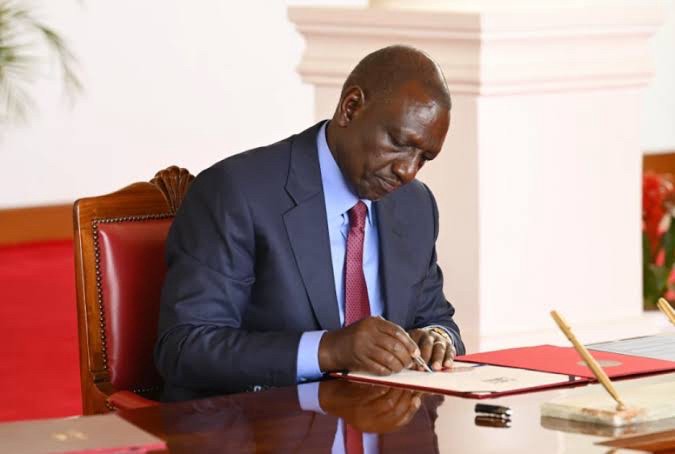
Kenyan President Ruto Signs Finance Bill 2025 Into Law Hours After Deadly Protests Leave 16 Dead

Kenyan President William Ruto has officially signed the Finance Bill 2025 into law. The signing came hours after the first anniversary of the anti-tax demonstrations turned deadly, leaving at least 16 people dead, according to Amnesty International.
The new law introduces significant changes to the country’s tax landscape, including amendments to the Income Tax Act, the Value Added Tax Act, and the Excise Duty Act. Key among them is a mandatory requirement for employers to automatically apply all eligible tax reliefs, deductions, and exemptions on behalf of their employees.
Salaried workers are set to benefit from an increase in the daily tax-exempt subsistence allowance—from KSh2,000 to KSh10,000, as well as full tax exemptions on pensions and retirement gratuity payments. The Finance Act also provides a reduced corporate tax rate of 15 per cent for startups for their first three years and for major investors injecting over KSh3 billion into the economy, for a decade.
Additionally, the controversial Digital Assets Tax has been repealed, replaced with a 5 per cent excise duty on transaction fees charged by virtual asset providers. In a bid to attract high-value investments, the Capital Gains Tax has been slashed from 15 to 5 per cent.
The law grants the government authority to access KSh1.88 trillion from the Consolidated Fund for the 2025/2026 financial year, alongside KSh671.99 billion from internally generated revenues by ministries, departments, and agencies.
Notably, a proposal to give the Kenya Revenue Authority (KRA) unrestricted access to personal data was struck out by Parliament following fierce public opposition, marking a rare instance of lawmakers aligning with public sentiment in a heated policy debate.
On Wednesday, June 25, thousands of demonstrators flooded the streets of Nairobi and other major cities to mark the first anniversary of the deadly anti-tax protests of 2024, which claimed more than 60 lives.
What began as a peaceful commemoration descended into chaos, as police deployed live ammunition, tear gas, and water cannons to disperse the crowds. The resulting violence claimed at least 16 lives, with scores more injured and arrested. The Kenya National Commission on Human Rights and Amnesty International condemned the use of force, calling for accountability and restraint from law enforcement.
Amidst the demonstration yesterday, the Communications Authority of Kenya (CA) directed all television and radio stations to stop live coverage of the nationwide protests. In a memo sent to all broadcasters, CA Director General David Mugonyi said the live transmission of the demonstrations goes against the Kenyan Constitution, as well as the Kenya Information and Communications Act, 1998.
However, yesterday’s protests were not just about the Finance Bill anniversary, but also recent incidents of police brutality. As earlier reported by West Africa Weekly, public outrage has intensified in recent weeks following the death of activist and blogger Albert Ojwang, who died earlier this month while in police custody. He had been arrested after posting content online that criticised a senior police officer.
Read More:
- Kemi Adetiba’s Bold New Crime Drama ‘To Kill A Monkey’ Dives Into Friendship, Temptation And The Price of Survival, Set To Premiere July 18 On Netflix
- Mali and Russia Sign Strategic Agreements in Gold, Energy, and Agriculture Sector
About The Author
Related Articles
Tinubu Govt Questioned Over Super Eagles Bonus Standoff
Nigeria’s Super Eagles were thrown into turmoil at the 2025 Africa Cup...
ByWest Africa WeeklyJanuary 9, 2026Tinubu’s govt pays celebrities to show payment of tax despite the altered tax law
A wave of video clips circulating on social media shows high-profile Nigerian...
ByWest Africa WeeklyJanuary 9, 2026Confederation of Sahel States Condemns US Armed Attack on Venezuela
The Confederation of Sahel States, known by its French acronym AES, has...
ByWest Africa WeeklyJanuary 8, 2026Burkina Faso Holds First Council of Ministers of 2026
The first Council of Ministers of the year 2026 was held on...
ByWest Africa WeeklyJanuary 8, 2026












Leave a comment